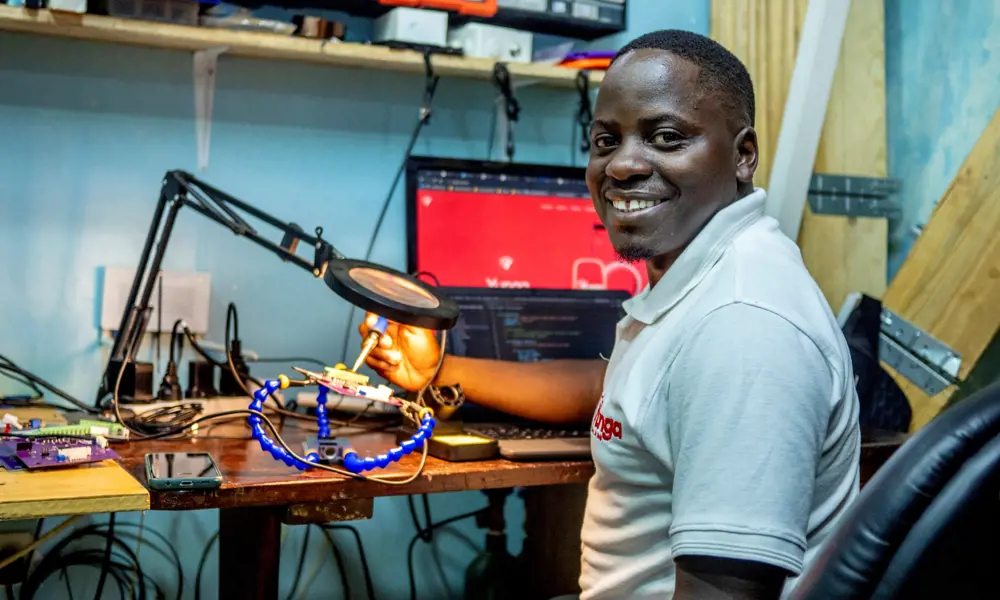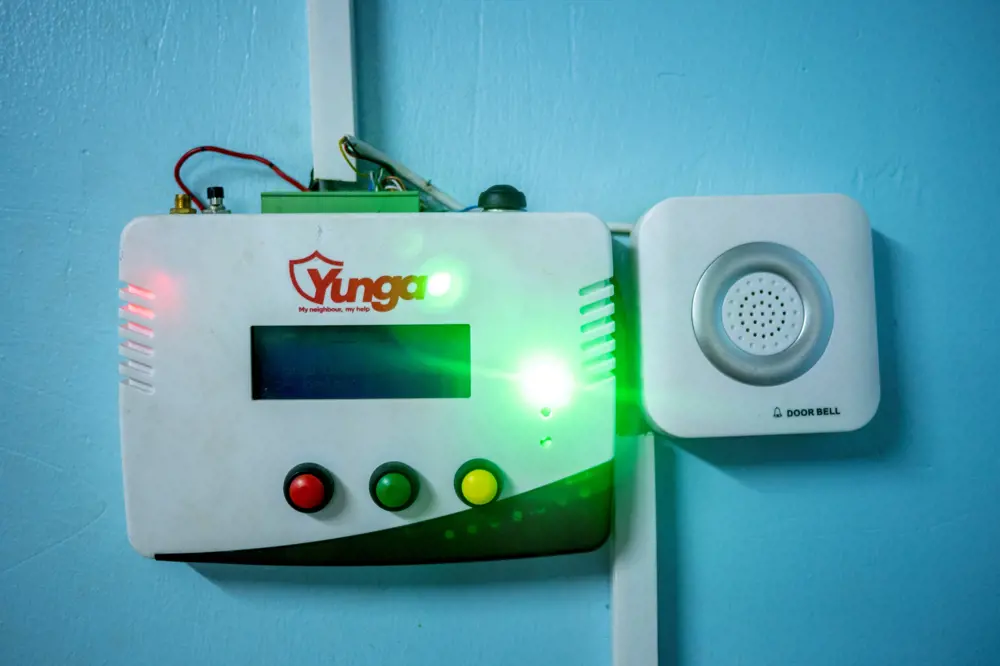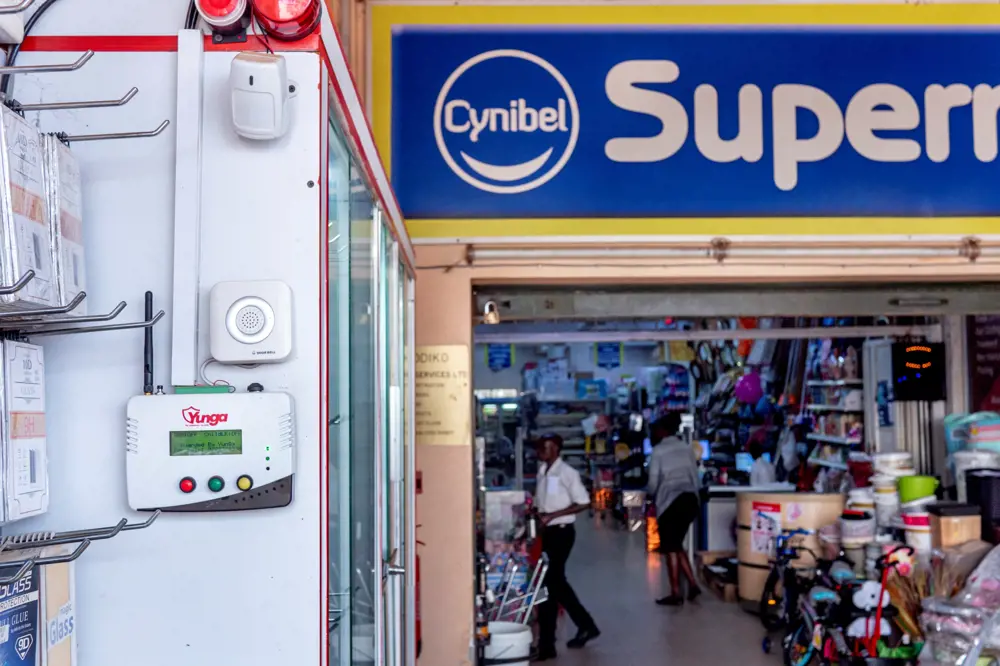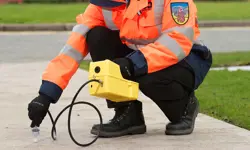
The community IoT network preventing break-ins in Uganda
Trust in the Ugandan police has eroded in recent years, says Anatoli, Founder of security device startup YUNGA. In fact, a 2016 report ranked Uganda’s police force in the bottom four out of 127 countries. This measured their responsiveness to “internal security challenges”; in other words, how well they are protecting public safety and maintaining law and order.
Anatoli describes the police as underpaid, understaffed and under-resourced. He cites a Hague Institute of Innovation and Law report, in which 80% of Ugandans surveyed don’t follow up when taking cases to local police stations. Many don’t report at all.
Anatoli points out that more affluent people can hire private security, at about $135 per month. But most Ugandans can’t afford to do this. Traditional electronic security alarm systems are even more expensive upfront, ranging from $500 to $1,000 each. Furthermore, the communities that Anatoli has worked with see them as overpriced and ineffective, as the sound of an alarm alone doesn’t seem to deter burglars.
For Anatoli, it’s also personal. In a series of break-ins, the software engineer lost $1,500 worth of property. So, he decided to start his company, YUNGA, to develop an app that he envisaged would link households to the local police station to call them out for emergencies. But it evolved into something slightly different.

A YUNGA device installed in a household. The red button can be used to trigger an emergency response. A smartphone app can also trigger the alarm if the user isn't near to the device, and at night users can also set a motion-sensing, automatic response © Tiffany Gravel
The 10-household model
YUNGA was inspired by a traditional African practice of drumming to call for help within the local community in emergencies. This practice originated in Tanzania before spreading to communities in Uganda, Kenya and Nigeria. Anatoli describes it as the 10-household model, due to the typical size of communities that use it. “If I drum once, they know I have a sick person. If I drum twice, then I have an attack,” he says.
Just like the 10-household model, communities using YUNGA devices find strength in numbers. They’re installed in a minimum of 10 houses in a community – usually about 15 homes. Each device costs $135 – but as a one-off payment, this is much cheaper than alternative options.
The security system is based around a wall-mounted device. For residents, there are three options in the event of a break-in. First, the resident can tap a red button on the screen to trigger an alarm and call for help. Second, there’s also an intelligent motion sensor that can activate it, for example, if it’s late at night and the resident is in bed asleep. Finally, if the resident isn’t physically close to the alarm, they can trigger the emergency response through a smartphone app.
Calling for help in each of these three ways pushes a signal to other community members with networked devices, as well as the local police. In practice, this means when one alarm goes off, all device screens show who’s in danger. It capitalises on the bonds between community members, effectively deterring burglars with the promise of a community response to crime.

The device also protects commercial premises such as shops © Tiffany Gravel
Connecting rural areas
YUNGA’s devices used to communicate with each other using SIM cards and mobile data. But in 2021, the team was forced to switch tack, as a week-long, country-wide telecoms outage meant the devices they had installed for customers had no service.
To prevent this happening again, they instead connected the devices to a long-range network able to operate over much greater distances than Wi-Fi. Called a low-power, wide area network (LoRaWAN), it enabled YUNGA’s devices to communicate locally over radio waves, using antennas. The fact that no internet is required means YUNGA’s security devices work, even in rural areas.
Another challenge the company has overcome was initially caused by an unlikely suspect: residents’ children. Anatoli explains how sometimes young children playing with a parent’s phone could trigger a false alarm by accident. This was a much easier fix for YUNGA. The team added software logic to the alarm button, so that it had to be pressed for two seconds to activate the distress call.
International appeal
So far, 1,700 households have installed the YUNGA device. It has prevented 216 break-ins. “What we are hearing is that there’s a very great sense of security when they know that they have really armed the YUNGA system within their community,” says Anatoli.
New businesses like YUNGA often rely on customers to spread the word about their products. But for residents who have installed YUNGA’s device, there’s an added benefit in recommending it to their neighbours. It means they can grow their local YUNGA community and improve their own security.
Beyond the happy customers, the Ugandan police are watching YUNGA’s success closely too. Anatoli says local forces are trying to understand how they can support communities using the network. It also has international appeal: YUNGA has been approached by the Kenyan and Ghanaian government, as well as people in Nigeria and Botswana. The company was also a joint winner of the 2024 Africa Prize for Engineering Innovation, along with South African medtech startup FlexiGyn.
With this in mind, the team plans on having 30,000 devices installed by the end of 2024. And that’s not all they hope to achieve. Aware that some people may still be priced out, they’re looking to develop a “super affordable device” – under $15 – that simply plugs in, with three buttons.
“Our goal is to make sure our customers are safe and that the police can get to them,” says Anatoli. “As long as our customers remain safe for us, we are very happy that way.”
Keep up-to-date with Ingenia for free
SubscribeRelated content
Electricals & electronics

Accelerometers
Used in earthquake measurements, laptops, planes and even in stargazing apps, today’s accelerometers are much smaller than when they were first developed in 1927. Find out how they detect movement and vibration.

How to maximise loudspeaker quality
Ingenia asked Dr Jack Oclee-Brown, Head of Acoustics at KEF Audio, to outline the considerations that audio engineers need to make when developing high-quality speakers.

Cable fault locator
The winner of the Institute of Engineering and Technology’s 2014 Innovation Award was EA Technology’s CableSnifferTM, which uses a probe and chemical sensing technology to identify faults, saving energy companies millions of pounds each year.

High speed evolution
In December 2010, Eurostar International Ltd awarded a contract for 10 new high speed trains to Siemens. The company has used a system developed over decades to maximise the performance and passenger-carrying ability of its 320km/h trains.
Other content from Ingenia
Quick read

- Environment & sustainability
- Opinion
A young engineer’s perspective on the good, the bad and the ugly of COP27

- Environment & sustainability
- Issue 95
How do we pay for net zero technologies?
Quick read

- Transport
- Mechanical
- How I got here
Electrifying trains and STEMAZING outreach

- Civil & structural
- Environment & sustainability
- Issue 95